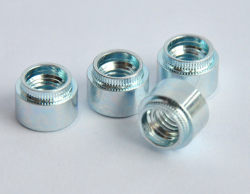Self Clinching Studs, also known as blind rivet studs, are a type of fixture used to connect two or more workpieces. They usually consist of two parts: a stud with internal threads and a socket with external threads. In use, the stud is compressed and held in the workpiece by the sleeve. So, which material of the Pressure Riveting Stud is cheaper?

When selecting the material of the rivet stud, the following factors generally need to be considered: strength, corrosion resistance, weight, cost, etc. Different materials will exhibit different characteristics in these aspects. Here are some relatively inexpensive standoff stud materials:
Steel: Steel is a strong, heavy metal material, but relatively inexpensive. Steel can be used to make various types of bolts and nuts, and therefore can also be used to make standoff studs. However, steel is easily corroded by oxidation and requires anti-corrosion treatment.
Stainless Steel: Stainless steel is corrosion resistant and relatively inexpensive. Stainless steel standoffs are usually made of 304 or 316 stainless steel, which are corrosion resistant and have good strength. However, stainless steel is relatively heavy, and if you need a lightweight design, stainless steel is not a good choice.
Aluminum alloy: Aluminum alloy is a lightweight, high-strength metallic material, making it ideal for the manufacture of standoffs that require a lightweight design. Aluminum alloy standoffs are usually made of 6000 series or 7000 series aluminum alloys, which have good strength and corrosion resistance. In addition, aluminum alloy also has good thermal conductivity, so it is suitable for use in high temperature environments.
Copper: Copper is a metal material with good electrical conductivity and good corrosion resistance, and it is also a relatively cheap material. Copper rivet studs are usually used in occasions that require good electrical conductivity, such as electronic products.
Materials, each material has its own advantages and disadvantages, it is necessary to choose the appropriate material according to the specific usage scenario. Let’s take a closer look at the pros and cons of each material.
Steel: Steel is a common standoff stud material and is relatively inexpensive. Steel has high strength and hardness, so it is suitable for occasions that need to withstand large loads. However, steel is easily corroded by oxidation and requires anti-corrosion treatment. Also, steel is relatively heavy and not a good choice if a lightweight design is required.
Stainless Steel: Stainless steel is a metal material with corrosion resistance and is relatively inexpensive. Stainless steel standoffs are usually made of 304 or 316 stainless steel, which have good corrosion resistance and strength. However, stainless steel is relatively heavy, and if you need a lightweight design, it is not a good choice. In addition, the price of stainless steel is relatively high compared to other materials, so special attention should be paid to cost control.
Aluminum alloy: Aluminum alloy is a lightweight, high-strength metallic material ideal for use in the manufacture of standoffs that require a lightweight design. Aluminum alloy standoffs are usually made of 6000 series or 7000 series aluminum alloys, which have good strength and corrosion resistance. In addition, aluminum alloy has good thermal conductivity and is suitable for use in high temperature environments. However, the price of aluminum alloy is high relative to other materials, so there is a trade-off between cost and performance. We have flare-in nuts production, you can contact us if you need.
Copper: Copper is a metal material with good electrical conductivity and good corrosion resistance, and it is also a relatively cheap material. Copper rivet studs are usually used in occasions that require good electrical conductivity, such as electronic products. However, copper has lower strength than other materials, so it is only suitable for low load applications.
To sum up, self clinching fasteners of different materials have their own advantages and disadvantages, and they need to be selected according to specific usage scenarios and requirements. When choosing a material, it is necessary to comprehensively consider the strength, corrosion resistance, weight, cost and other factors of the material in order to choose the most suitable one for you.